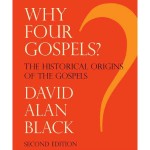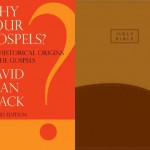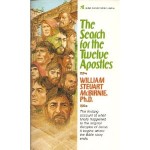Review of the Common English Bible NT – 3
Recently, I received a (free) review copy of the Common English Bible New Testament. (The link is to the exact version of the book that I received. Here is a link to the Common English Bible website.) Over the next few days, I’m going to offer my review of this new English translation. In this post, I’m going to compare NT passages about gathering, community, fellowship, and discipleship between the CEB and the ESV.
Here is the first passage from Matthew:
Jesus came near and spoke to them, “I’ve received all authority in heaven and on earth. Therefore, go and make disciples of all nations, baptizing them in the name of the Father and of the Son and of the Holy Spirit, teaching them to obey everything that I’ve commanded you. Look, I myself will be with you every day until the end of this present age.” (Matthew 28:18-20 CEB)
And Jesus came and said to them, “All authority in heaven and on earth has been given to me. Go therefore and make disciples of all nations, baptizing them in the name of the Father and of the Son and of the Holy Spirit, teaching them to observe all that I have commanded you. And behold, I am with you always, to the end of the age.” (Matthew 28:18-20 ESV)
Here is a passage from Romans:
So, brothers and sisters, because of God’s mercies, I encourage you to present your bodies as a living sacrifice that is holy and pleasing to God. This is your appropriate priestly service. Don’t be conformed to the patterns of this world, but be transformed by the renewing of your minds so that you can figure out what God’s will is – what is good and pleasing and mature. Because of the grace that God gave me, I can say to each one of you: don’t think of yourself more highly than you ought to think. Instead be reasonable since God has measured out a portion of faith to each one of you. We have many parts in one body, but the parts don’t all have the same function. In the same way, though there are many of us, we are one body in Christ, and individually we belong to each other. We have different gifts that are consistent with God’s grace that has been given to us. If you gift is prophecy, then you should prophesy in proportion to your faith. If you gift is service, devote yourself to serving. If your gift is teaching, devote yourself to teaching. If your gift is encouragement, devote yourself to encouraging. The one giving should do it with no strings attached. The leader should lead with passion. The one showing mercy should be cheerful. (Romans 12:1-8 CEB)
I appeal to you therefore, brothers, by the mercies of God, to present your bodies as a living sacrifice, holy and acceptable to God, which is your spiritual worship. Do not be conformed to this world, but be transformed by the renewal of your mind, that by testing you may discern what is the will of God, what is good and acceptable and perfect. For by the grace given to me I say to everyone among you not to think of himself more highly than he ought to think, but to think with sober judgment, each according to the measure of faith that God has assigned. For as in one body we have many members, and the members do not all have the same function, so we, though many, are one body in Christ, and individually members one of another. Having gifts that differ according to the grace given to us, let us use them: if prophecy, in proportion to our faith; if service, in our serving; the one who teaches, in his teaching; the one who exhorts, in his exhortation; the one who contributes, in generosity; the one who leads, with zeal; the one who does acts of mercy, with cheerfulness. (Romans 12:1-8 ESV)
Here is a passage from 1 Corinthians:
What is the outcome of this, brothers and sisters? When you meet together, each one has a psalm, a teaching, a revelation, a tongue, or an interpretation. All these things must be done to build up the church. (1 Corinthians 14:26 CEB)
What then, brothers? When you come together, each one has a hymn, a lesson, a revelation, a tongue, or an interpretation. Let all things be done for building up. (1 Corinthians 14:26 ESV)
Here is a passage from Ephesians:
He gave some apostles, some prophets, some evangelists, and some pastors and teachers. His purpose was to equip God’s people for the work of serving and building up the body of Christ until we all reach the unity of faith and knowledge of the Son of God. God’s goal is for us to become mature adults – to be fully grown, measured by the standard of the fullness of Christ. As a result, we aren’t supposed to be infants any longer who can be tossed and blown around by every wind that comes from teaching with deceitful scheming and the tricks people play to deliberately mislead others. Instead, by speaking the truth with love, let’s grow in every way into Christ, who is the head. The whole body grows from him, as it is joined and held together by all the supporting ligaments. The body makes itself grow in that it builds itself up with love as each one does their part. (Ephesian 4:11-16 CEB)
And he gave the apostles, the prophets, the evangelists, the pastors and teachers, to equip the saints for the work of ministry, for building up the body of Christ, until we all attain to the unity of the faith and of the knowledge of the Son of God, to mature manhood, to the measure of the stature of the fullness of Christ, so that we may no longer be children, tossed to and fro by the waves and carried about by every wind of doctrine, by human cunning, by craftiness in deceitful schemes. Rather, speaking the truth in love, we are to grow up in every way into him who is the head, into Christ, from whom the whole body, joined and held together by every joint with which it is equipped, when each part is working properly, makes the body grow so that it builds itself up in love. (Ephesians 4:11-16 ESV)
Here is a passage from Hebrews:
Let’s also think about how to motivate each other to show love and do good works. Don’t stop meeting together with other believers, which some people have gotten into the habit of doing. Instead, encourage each other, especially as you see the day drawing near. (Hebrews 10:24-25 CEB)
And let us consider how to stir up one another to love and good works, not neglecting to meet together, as is the habit of some, but encouraging one another, and all the more as you see the Day drawing near. (Hebrews 10:24-25 ESV)
What do you think?
Review of the Common English Bible NT – 2
Recently, I received a (free) review copy of the Common English Bible New Testament. (The link is to the exact version of the book that I received. Here is a link to the Common English Bible website.) Over the next few days, I’m going to offer my review of this new English translation. In this post, I’m going to compare NT passages about leadership between the CEB and the ESV.
Here is the first passage from Matthew:
Now when the other ten disciples heard about this, they became angry with the two brothers. But Jesus called them over and said, “You know that those who rule the Gentiles show off their authority over them and their high-ranking officials order them around. But that’s not the way it will be with you. Whoever wants to be great among your will be your servant. Whoever wants to be first among you will be your slave – just as the Human One didn’t come to be served but rather to serve and to give his life to liberate many people.” (Matthew 20:24-28 CEB)
And when the ten heard it, they were indignant at the two brothers. But Jesus called them to him and said, “You know that the rulers of the Gentiles lord it over them, and their great ones exercise authority over them. It shall not be so among you. But whoever would be great among you must be your servant, and whoever would be first among you must be your slave, even as the Son of Man came not to be served but to serve, and to give his life as a ransom for many.” (Matthew 20:24-28 ESV)
Here is a passage from Acts:
Watch yourselves and the whole flock, in which the Holy Spirit has placed you as overseers, to shepherd God’s church, which he obtained with the death of his own Son… I haven’t craved anyone’s silver, gold, or clothing. You yourselves know that I have provided for my own needs and for those of my companions with my own hands. In everything I have shown you that, by working hard, we must help the weak. In this way we remember the Lord Jesus’ words: “It is more blessed to give than to receive.” (Acts 20:28, 33-35 CEB)
Pay careful attention to yourselves and to all the flock, in which the Holy Spirit has made you overseers, to care for the church of God, which he obtained with his own blood… I coveted no one’s silver or gold or apparel. You yourselves know that these hands ministered to my necessities and to those who were with me. In all things I have shown you that by working hard in this way we must help the weak and remember the words of the Lord Jesus, how he himself said, ‘It is more blessed to give than to receive.’ (Acts 20:28, 33-35 ESV)
Here is a passage from 1 Thessalonians:
Brothers and sisters, we ask you to respect those who are working with you, leading you, and instructing you. Think of them highly with love because of their work. Live in peace with each other. Brothers and sisters, we urge you to warn those who are disorderly. Comfort the discouraged. Help the weak. Be patient with everyone. (1 Thessalonians 5:12-14 CEB)
We ask you, brothers, to respect those who labor among you and are over you in the Lord and admonish you, and to esteem them very highly in love because of their work. Be at peace among yourselves. And we urge you, brothers, admonish the idle, encourage the fainthearted, help the weak, be patient with them all. (1 Thessalonians 5:12-14 ESV)
Here is a passage from 1 Timothy:
Elders who lead well should be paid double, especially those who work with public speaking and teaching. The scripture says, You shouldn’t put a muzzle on an ox while it treads grain, and Workers deserve their pay. Don’t accept an accusation made against an elder unless it is confirmed by two or three witnesses. Discipline those who are sinning in front of everyone so that all the others will be afraid. (1 Timothy 5:17-20 CEB)
Let the elders who rule well be considered worthy of double honor, especially those who labor in preaching and teaching. For the Scripture says, “You shall not muzzle an ox when it treads out the grain,” and, “The laborer deserves his wages.” Do not admit a charge against an elder except on the evidence of two or three witnesses. As for those who persist in sin, rebuke them in the presence of all, so that the rest may stand in fear. (1 Timothy 5:17-20 ESV)
Here is a passage from Titus:
The reason I left you behind in Crete was to organize whatever needs to be done and to appoint elders in each city, as I told you. Elders should be without fault. They should be faithful to their spouse, and have faithful children who can’t be accused of self-indulgence or rebelliousness. This is because overseers should be without fault as God’s managers: they shouldn’t be stubborn, irritable, addicted to alcohol, a bully, or greedy. Instead, they should show hospitality, love what is good, and be reasonable, ethical, godly, and self-controlled. They must pay attention to the reliable message as it has been taught to them so that they can encourage people with healthy instruction and refute those who speak against it. (Titus 1:6-9 CEB)
This is why I left you in Crete, so that you might put what remained into order, and appoint elders in every town as I directed you – if anyone is above reproach, the husband of one wife, and his children are believers and not open to the charge of debauchery or insubordination. For an overseer, as God’s steward, must be above reproach. He must not be arrogant or quick-tempered or a drunkard or violent or greedy for gain, but hospitable, a lover of good, self-controlled, upright, holy, and disciplined. He must hold firm to the trustworthy word as taught, so that he may be able to give instruction in sound doctrine and also to rebuke those who contradict it. (Titus 1:5-9 ESV)
Here’s a passage from Hebrews:
Rely on your leaders and defer to them, because they watch over your whole being as people who are going to be held responsible for you. They need to be able to do this with pleasure and not with complaints about you, because that wouldn’t help you. (Hebrews 13:17 CEB)
Obey your leaders and submit to them, for they are keeping watch over your souls, as those who will have to give an account. Let them do this with joy and not with groaning, for that would be of no advantage to you. (Hebrews 13:17 ESV)
And, finally, here’s a passage from 1 Peter:
Therefore, I have a request for the elders among you. (I ask this as a fellow elder and a witness of Christ’s sufferings, and as one who shares in the glory that is about to be revealed.) I urge the elders: like shepherds, tend the flock of God among you. Watch over it. Don’t shepherd because you must, but do it voluntarily for God. Don’t shepherd greedily, but do it eagerly. Don’t shepherd by ruling over those entrusted to your care, but become examples to the flock. (1 Peter 5:1-3 CEB)
So I exhort the elders among you, as a fellow elder and a witness of the sufferings of Christ, as well as a partaker in the glory that is going to be revealed: shepherd the flock of God that is among you, exercising oversight, not under compulsion, but willingly, as God would have you; not for shameful gain, but eagerly; not domineering over those in your charge, but being examples to the flock. (1 Peter 5:1-3 ESV)
So, what do you think?
Review of the Common English Bible NT – 1
Recently, I received a (free) review copy of the Common English Bible New Testament. (The link is to the exact version of the book that I received. Here is a link to the Common English Bible website.) Over the next few days, I’m going to offer my review of this new English translation. In this post, I’m going to discuss the appearance, text, and readability.
To begin with, I will only be reviewing the New Testament translation, because the version that I received only included the New Testament.
First, I was very surprised when I opened the box. I was expecting a cheap, paperback copy of the Common English Bible. Instead, the copy that I received has a very nice two-tone binding.
Similarly, I was also pleasantly surprised at the print and the paper. The paper seems thicker than that used on most Bibles. Also, the font size was larger. Together, this made for an easy-to-read Bible.
The translation is also easy-to-read. I found the use of conjunctions and short sentences to be refreshing and conversational.
The Common English Bible (New Testament) is based on the twenty-seventh edition of the Nestle-Aland Greek text. This is standard for most English translations these days. (It will be interesting to see what happens now that the SBL Greek text has been released.)
According to the notes, 115 scholars from 22 different faith traditions worked on this new translation. I was happy to see a broad range of traditions and backgrounds represented among these translators. Apparently, the new Bible translations was also read and critiqued by many, many more people from various denominations and educational backgrounds.
So, do I agree with all of the translation and interpretation decisions made by the translation committee? Well, no, of course not. But, I bet if you polled each of the translation committee members, you’ll find that none of them agree with all of the translation decisions either.
There is one general translation decision that some people may struggle with – I did at first. The translation notes read: “When ho huios tou anthropou (Greek) is used as a title for Jesus, the CEB refers to Jesus as ‘the Human One.'”
In the next two posts, I’m going to compare passages from the Common English Bible to the same passages in the ESV. Since I’m interested in studying the church, I will choose passages that are important for ecclesiology.
Review of Why Four Gospels
A few days ago, thanks to Energion Publications, I received a review copy of Why Four Gospels? by David Alan Black. They sent the book to me without charge (free) with only one stipulation, that I review the book. They did not ask for a good review, only for a review.
Before I begin the review, I should tell you that I personally know Dave Black, and that, in fact, he is my PhD mentor. We have talked about the issues in this book before, and I have previously read an earlier edition of the book.
With that out of the way, I can give you my review: If you are interested in the New Testament – specifically the Gospels – and specifically why we have four books that are called Gospels – then you must read this book.
The book is written so that anyone can read it and understand it. You do not need a PhD or even a seminary (or even a college) education in order to understand Black’s explanation of the development of the Gospels. (In fact, one of the things that Dave Black does very well is write books introducing readers to complicated subjects.)
However, if you are a scholar, I would urge you to read this book as well. Will you agree with Black? Perhaps not. But, perhaps he will convince you to consider a source of evidence that you (and your teachers) may have overlooked.
What evidence is that? The patristic evidence. Specifically, Black begins his study with an examination of the statements of various authors who wrote from the early second century to the fourth century. Each statement concerns the author, occasion of writing, and/or time of writing for one or more of the four Gospels.
Does Black suggest that we accept all of this information uncritically? Does he suggest that all of the available patristic evidence is uniform? The answer to both of those questions is, “No.” Instead, Black sifts the evidence for consistencies, and he finds that there are many.
On the other hand, modern New Testament scholarship has tended to dismiss the patristic evidence. Black now says that this evidence must be weighed and factored into other evidence, such as the internal evidence. For example, in order to promote Markan Priority (that is, that the Gospel of Mark was written first among the four Gospels), scholars must deal with the fact that the patristic authors overwhelmingly (unanimously?) said that Matthew was written first.
There is much more to this book. For example, Black suggest that the four Gospels (and the order of their writing) can be explained by the needs of the early church. Similarly, he offers an explanation of the zig-zag style of Mark (that is, that Mark matches Matthew, then Luke, then back to Matthew, etc.). Obviously, there is some conjecture here. But, in order to respond, I believe that other scholars must offer explanations that deal with both the internal evidence and the external evidence.
So, buy and read Why Four Gospels? Even if you do not agree with Black, it will at least be a good example of how to write on a difficult subject in a way that almost all readers will understand.
Two New Books
This afternoon, I was laying on the couch in our living room, not feeling very well (but better than yesterday, I think), when I received a surprise. The mailman delivered two new (and free) books for review:
1. Why Four Gospels (2nd ed) by David Alan Black
2. Common English Bible New Testament
I’m looking forward to reading and reviewing these soon.
Searching for the Twelve
I’m currently reading (among other things) The Search for the Twelve Apostles by William Steuart McBirnie. (FYI… this book was given to me by Eric from “A Pilgrim’s Progress” before his family moved to India, but I’m only just not getting around to reading it.) McBirnie is searching Scripture, other documents, and traditions to determine what happened (as well as can be determined) to the twelve apostles after the accounts of them in Scripture.
In his introduction, he writes the following:
The Twelve Apostles were important to the thinking of the early Christians, but were not considered be more than leaders, brothers and dearly beloved friends at first. We look upon them as the founders of churches. It took some time for their spiritual descendents to see them as the Fathers of the whole church movement. Their authority at first was in the anointing of the Holy Spirit, not in ex cathedra pronouncements on doctrine.
True, the first council of Apostles in Jerusalem gave authoritarian pronouncements concerning the admittance of the Gentile converts into the Christian movement. Yet this did not seem to have the ecclesiastical authority then that we attach to it now. We could, in face, wish there had been more pronouncements; say, concerning heresy, forms of church government, social matters, etc. But there was nothing much that came collectively from the Apostles. They simply proclaimed individually what they had heard from Jesus Christ. (pg 15-16, italics in original)
While I didn’t know what to expect from this book, I am excited about beginning with the quote above. I agree completely with the author. The “ecclesiastical position” that is given to the apostles is anachronistic – meaning, it came after they had lived and died.
In Scripture, the apostles refer to themselves as servants, brothers, or co-workers. Any authority that others attempted to give to them, they returned to all believers. They were not interested in created great organization, but in building maturing disciples of Jesus Christ.
However, as the years progressed, Christians that followed after them began to add more and more pomp and circumstance to the role of the twelve apostles.
It is going to be very interesting to see how McBirnie’s book progresses from this beginning. I’m greatly challenged by the thinking of the twelve apostles as brothers and dear friends, and leaders certainly, more mature than me and urging me on to the same level of maturity (and beyond).
What do you think of McBirnie’s statement above?
(By the way, Eric, now that you’re back in the States, you can have this book back… once I finish reading it.)
New Edition of Why Four Gospels
Energion Publications is releasing the second edition of Dave Black’s Why Four Gospels? I’ve read the first edition of this book, and I’m looking forward to reading and reviewing the second edition.
This is what the publisher says about the book:
In Why Four Gospels? noted Greek and New Testament scholar David Alan Black, concisely and clearly presents the case for the early development of the gospels, beginning with Matthew, rather than Mark. But this is much more than a discussion of the order in which the gospels were written. Using both internal data from the gospels themselves and an exhaustive and careful examination of the statements of the early church fathers, Dr. Black places each gospel in the context of the early development of Christianity.
Though Markan priority is the dominant position still in Biblical scholarship, Dr. Black argues that this position is not based on the best evidence available, that the internal evidence is often given more weight than it deserves and alternative explanations are dismissed or ignored. If you would like an outline of the basis for accepting both early authorship of the gospels and the priority of Matthew, this book is for you.
Apparently, there are some review copies available. If you want to read and review this book, send an email to pubs@energion.com and let them know that you would like a review copy.
The Disconnect with Commentaries
Eric from “A Pilgrim’s Progress” shares an “Interesting Commentary on I Corinthians 14:26-33.” Eric is referring to William Barclay’s commentary on 1 Corinthians which was published in 1975. Eric includes this quote from Barclay:
There was obviously a flexibility about the order of service in the early Church. Everything was informal enough to allow any man who felt that he had a message to give to give it. It may well be that we set far too much store on dignity and order nowadays, and have become the slaves of orders of service. The really notable thing about an early Church service must have been that almost everyone came feeling that he had both the privilege and the obligation of contributing something to it. A man did not come with the sole intention of being a passive listener; he came not only to receive but to give. Obviously this had its dangers, for it is clear that in Corinth there were those who were too fond of the sound of their own voices; but nonetheless the Church must have been in those days much more the real possession of the ordinary Christian. It may well be that the Church lost something when she delegated so much to the professional ministry and left so little to the ordinary Church member. (page 134)
Eric adds some great remarks to this quote in his post. But I wanted to mention something else.
A few years ago, I wrote an exegesis paper on 1 Corinthians 14:26-40 for a seminary class. While doing research for that paper, I came across several commentaries with similar conclusions. In other words, when studying Scriptures, Barclay’s comments above seem obvious (well, perhaps not to everyone, but to most commentaries that I’ve read).
But, there’s a disconnect when it comes to practice. Very few churches actually meet the way that Barclay (and many others) conclude that the early church met.
Why do you think that disconnect exists?
Why Four Gospels, 2ed
Energion Publications has announced that they will publish the second edition of Dave Black’s Why Four Gospels? The release date is set for October 15, 2010.
This is what the Energion says about the book:
In Why Four Gospels? Dr. Black traces the history, origin, and development of the four NT gospels and challenges the dominant view that Mark was written first and then used by Matthew and Luke in the composition of their gospels. While he relies on both internal and external evidence, Dr. Black places special emphasis on giving due weight to the testimony of the early church fathers.
If you’ve never read Why Four Gospels?, I would highly recommend it. In the book, Dave introduces the confusing subject of the synoptic problem. He talks about the different suggested solutions to the problem, and he offers his own solution.
A Few Good Books
My friend Dan at “The Ekklesia in Southern Maine” asked “What to Read?” I offered the following list of books about the church that I enjoyed reading over the last few years. Obviously – as with any book – I didn’t agree with everything in all of the books. But in each book, I found something interesting and exciting about the church as described in Scripture.
(These are in no particular order)
Paul’s Idea of Community by Robert Banks
Engaging with God by David Peterson
Church Without Walls by Jim Peterson
When the Church was a Family by Joseph Hellerman
Reimagining Church by Frank Viola
The Rabbit and the Elephant by Tony and Felicity Dale
What books about the church would you add to this list?







